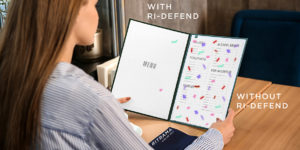






 From Ritrama laboratories, here comes RI-DEFEND, the latest generation polymeric vinyl lamination with antibacterial and self-sanitizing properties. Recently the Group has presented many products specifically designed to better and safely manage the reopening of shops, public offices, and the return to the "new normality" in the post-pandemic period. From the "Floor Talker series" products to communicate the correct social distancing on floors, to the materials to customize walls and windows with messages to keep the attention focused on the correct behaviours to be adopted.
From Ritrama laboratories, here comes RI-DEFEND, the latest generation polymeric vinyl lamination with antibacterial and self-sanitizing properties. Recently the Group has presented many products specifically designed to better and safely manage the reopening of shops, public offices, and the return to the "new normality" in the post-pandemic period. From the "Floor Talker series" products to communicate the correct social distancing on floors, to the materials to customize walls and windows with messages to keep the attention focused on the correct behaviours to be adopted.
The Group’s portfolio is therefore enriched with a self-adhesive lamination film with antibacterial properties, intended for the antimicrobial protection of any type of graphics and for the coating of all those surfaces subject to high use by the public, for both indoor and outdoor medium-long-lasting applications. The combination between the permanent acrylic adhesive and the high-quality polymeric vinyl film make RI-DEFEND the best choice for creating an invisible barrier against germs and bacteria on graphics, doors, handles, windows, tables, chairs, displays, touch screens or in all those areas that require a high level of hygiene such as hospitals and laboratories.
RI-DEFEND contains an internal antibacterial active substance which, unlike conventional non-antibacterial solutions, guarantees protection to surfaces for long periods of time, eliminating up to 99.9% of the bacteria present on the film’s surface and preventing their proliferation. RI-DEFEND’s effectiveness has been verified and tested according to ISO 22196: 2011, allowing to establish that RI-DEFEND is effective on a large number of bacteria, including Escherichia Coli, Enterococcus Faecalis, Listeria Monocytogenes, Klebsiella Pneumoniae, Salmonella Enterica.
To guarantee the highest safety standards over time, RI-DEFEND has been designed and tested to ensure antibacterial activity for a duration of 5 years, proving to be able to resist unaltered to the intensive simulated washing procedures - recommended by the WHO (World Health Organization). These procedures provide surface treatment with specific disinfectants, such as benzalconium chloride or sodium hypochlorite solutions, commonly used to prevent the spread of SARS coronavirus.
Prepared on the basis of information from Ritrama